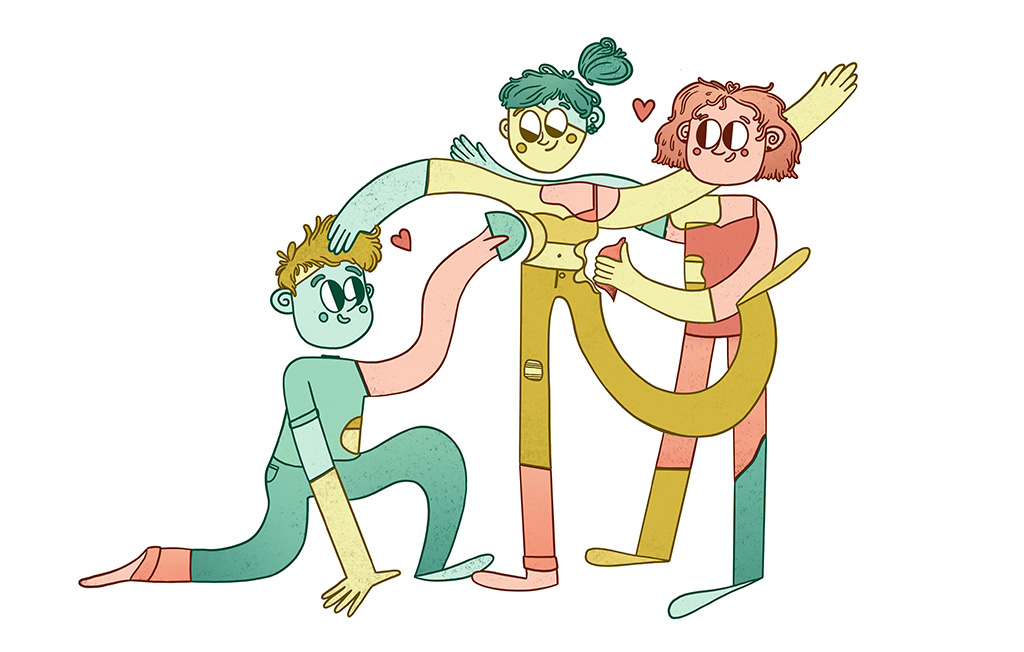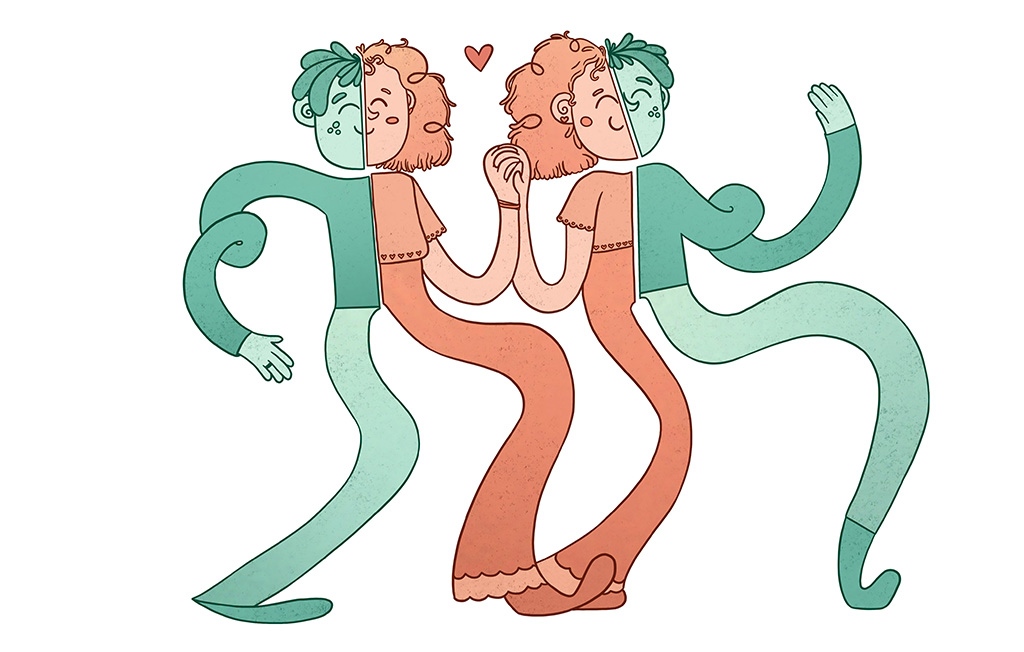Different partners, or rather monogamous: what does true love look like?
The summer vacation of 2022 was warm and sunny. Finally, the Dutch could party and flirt en masse. A “summer of love” experts predicted in advance. But what does love really mean? Univers editor Anne Grefkens went to investigate: “The more I try to understand love, the greater the incomprehension becomes.”

Unsuspectingly, I watched an episode of De Wereld Draait Door over two years ago. At the table was author and philosopher Connie Palmen talking about the 25th anniversary of the death of her great love Ischa Meijer. Upon hearing the words “all-consuming love,” I was all ears immediately. Because there is no subject that fascinates me as much as romantic love.
Probably because I philosophize about it endlessly and fail hopelessly. I regularly ask myself if love only comes when you don’t expect it. Whether one person can give you everything you seek and need. And whether being lonely together exists. But each time I end up with its elusiveness: the more I try to understand love, the greater the incomprehension becomes.
Hoping to discover a love manual, within one year I consumed Palmen’s entire oeuvre. Because one thing I knew for sure: that what Connie and Ischa had is real love. Unintentionally, an innocent interview became the starting point of my search for its meaning. A search that went inside and outside literature and now finds its reflection in this essay.
“So what are you looking for now to have to justify the choice to write?” wrote Palmen in one of her books. “That which I do not yet know,” replied her main character, ‘love.’”
The monogamous drama
With true love, one quickly thinks of marriage promises and eternal fidelity. But many young people today are experimenting with polygamous relationships. Perhaps love is better captured in the plural?
Indeed, no proverb is more famous than “love is the only thing that multiplies when you share it.” A proverb embraced by the polyamorous man. Who considers himself capable of loving several people at once, in a romantic and committed way. Writer and philosopher Simone van Saarloos, argues in her essay The Monogamous Drama (in Dutch) that monogamous relationships have a suffocating effect. This is in contrast to polyamorous connections that—she says—are less likely to lead to the drama in which nothing unexpected happens: “They merge into a cocoon, whereas maintaining relationships with multiple lovers always produces friction that keeps the interaction playful and alive.”
Van Saarloos hits the fear nail on the head of many here, because who wants a boring relationship? I too feel this fear on a regular basis. Why should I commit myself completely to someone when the potential danger of drudgery is lurking? Those around me call it fear of commitment. I call it experiencing selectively with different people.
‘Why commit myself fully to someone when the potential danger of drudgery is lurking?’
With one, for example, I learned how to set my boundaries. With another, I learned what self-respect means, and yet another taught me a new musical genre. With full conviction, then, I dare say that I could never have gained all this knowledge from one person. And yes, that sounds like praise for polyamorous relationships.
Yet, I kept running into monogamous walls. Especially when I bumped into Mr. Right, it clicked, but he turned out to have a Ms. Right. All potential intimate conversations, hilarious moments, and musical evenings disappeared like snow in the sun. My respect for someone else’s monogamous relationship always won out over my own polyamorous dream world.
“Wouldn’t the world be a much more beautiful place if we weren’t shackled by the monogamous drama?” I asked a friend after once again falling on my face. “Then everyone could have endless beautiful moments with new people all the time.” “You don’t believe you really want that, do you?” he replied. “You’ve read everything by Connie Palmen, you believe in one great love.”
The myth of the missing half
He was right. Even though Van Saarloos’ theory makes sense, I still believe that it is possible to meet someone with whom the relationship—even in the long run—remains playful and lively. My own parents are a good example of this. My mother started speaking to my father in the pub. The words “Do you often come here?” provided the first contact and now, 44 years later, they still make each other happy.

Yet I think a relationship like my parents’ is more unique than monogamous society would have us believe. In my opinion, there is also a certain ease in monogamy. After all, there are plenty of people who remain faithful to each other after the fizz in the coke is gone. There are also plenty of people who “would rather not be alone” and thus throw away their chances of true passion. Finally, there are still a lot of people for whom a great love is simply not possible. So, you also need a lot of luck to bump into your great love at the right time. But life would be boring not to strive for that, wouldn’t it?
People have been pondering this issue for centuries. Such was the case with the Greek philosopher Plato (ca. 427 B.C.- 347 B.C.). In the dialogue Symposium, written by him, Plato has several fictional speakers speak. A group of Athenian men discuss love during a feast of food and drink. One of them is Aristophanes, who has a very special story to tell. He shares with his listeners the myth of the missing half. This myth explains why we feel incomplete at some times and perfect at others. According to this myth, people used to look different: like a ball. We know humans as having one head and two arms and legs, but these earlier “sphere-shaped humans” would have had eight limbs and two heads.
Reportedly, these sphere-shaped humans were quite powerful. Therefore, supreme god Zeus intervened and decided to split the sphere-shaped humans in two. This is how people got their current body. As a result of this split, people feel lonely and lost because they are missing their counterpart. Finding this other half—their great love—makes people feel happy and complete.
All-consuming love
Although Aristophanes’s (or rather Plato’s) myth is immensely charming, I still do not believe in its message. After all, in my opinion, it does not demonstrate that love needs a counterpart. A human being is perfectly capable of facing the world with one head, two arms, and two legs. Moreover, a person without a counterpart can be happy and feel complete. He or she does not need anyone else for that. Not even someone cut from the same “sphere.” The chance of finding someone who perfectly suits you one hundred percent is almost nil.
On the other hand, it does demonstrate—I think—love when someone does not want to live without someone else. Even when this person is not perfect or completely compatible with you. I find it enormously loving that someone wants to attach him/herself to someone else and take all the risks of this attachment for granted, including imperfection. And that a divorce, an illness, death, or a terrible in-law does not stand in the way of this choice. This is in contrast to Van Saarloos’ understanding of a polyamorous love where expectations are looser and less conditional.
But then how do you recognize such a great love when it is right in front of you? If Palmen is to be believed, I only have to listen to my body. Indeed, according to her, the body betrays that which the head cannot yet comprehend. In a famous scene from the book I.M. (an ode to her great love Ischa Meijer), Connie and Ischa shit their pants at the same time. Simply because they were so crazy about each other.
On the other hand, if I am to believe my mother, I should just ask someone “if he often comes here.” With both of these “opinions,” I still have no idea what love exactly means. And although I think it’s a fairy-tale and sordid idea, I don’t think anyone is going to wet his pants for me. For that reason alone, I think I’ll go for the last option: “uhm, crazy question, do you often come here?”
Translated by Language Center, Riet Bettonviel






